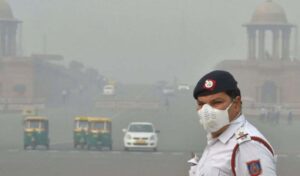Inviting the Inevitable: Can we bring Mother Earth back to a point of balance?
By SHRI RAM SHAW
New Delhi: “Sustainable development is very much possible if environmental safeguards are adhered to. The whole world is at a decisive moment wherein we have to choose to be with the planet – Mother Earth or invite the inevitable. Year after year, we have continued to deplete the resources of Earth, drilling the planet, chopping down trees, killing animals and thus reducing biodiversity,” said Shivkumar Bilagrami, renowned lyricist, shayar and Ghazal writer who has penned the song for a UN-backed music video – “Prithvi Manthan – The 2nd Churning” on pollution. He is currently serving as Joint Director, Lok Sabha Secretariat. Susmita Das, renowned singer popularly known as Lata Mangeshkar of Odisha has lent her velvet voice for the song based on environment – Mother Nature.
Calling upon people to stand and unite for the Planet Earth as “it is the only one we have and it’s in terrible condition”, Bilagrami further said, “We are still contributing to what is currently one of the most devastating conditions for the planet. Things have become extreme and through this song we have tried to convey the urgency, sensitivity and immediate action needed to stop climate change. So, the question arises – Can we bring Earth back to a point of balance? Each day must be Environment Day.”
“Prithvi Manthan – The 2nd Churning” – the music video based on Shiva Tandava Strotam and Sagar Manthan (Churning of the Sea) is basically a fusion of Bhakti and Nature (Environment) which conveys a strong message to protect our Mother Earth. This song has received many international awards including Golden Peacock.
This is genius of a song to combine both Hindu mythology and need for climate change awareness. This is the “Call for Action” conveyed through exhilarating music, song and beautiful dance…an immensely enjoyable brilliant symphony of music, mythology and environment. The befitting message is very apt, symbolic and powerful. Great concept, impactful lyrics and visualisation and if this doesn’t stir up humanity, then what will?
Sagar Manthan (Churning of the Sea): In Hindu mythology, the Gods and the Demons joined up to churn the seas to extract the hidden treasure. But the skimming also produced ‘Halahal’, the most vicious poison that threatened to destroy the entire universe. Lord Shiva came to everyone’s rescue and swallowed the poison to save the universe.
Prithvi Manthan (Skimming of the Earth): An analogy for over-exploitation of natural resources to meet our greed and unsustainable lifestyle. In the process, like ‘Halahal’ in Samudra Manthan, Green House gases and pollutants are deadly by-products, which has grown to such proportions that the very existence of humankind now stands jeopardized.
“In the song, we beseech divine intervention from Lord Shiva to absorb these poisons or give us collective and individual strength to imbibe this venom that has been our own creation,” Bilagrami said.
“What we are doing to the forests of the world is but a mirror reflection of what we are doing to ourselves and to one another. Let us pledge to make a cleaner and greener environment. We must join hands to save our beautiful planet as there is no other place in the universe so beautiful, so vibrant and so lively. Let us be more responsible. Mother Nature has always been kind to us and now it is time to return all the favours by showing a responsible attitude towards the environment,” said Bilagrami.
Extremely articulate and succinct, ‘‘Kabhi jab gaaon jata hoon, toh bachpan dhoondhta hoon main’’ famed Bilagrami regaled this journalist (Shri Ram Shaw) with innumerable anecdotes and experiences during an exclusive interview.
When asked, “You are basically identified as a lyricist and poet. Many singers have sung your songs and ghazals. Will you tell something about them”, he said, “It is true that many singers have given their voice to my poetry. Many famous singers like Anuradha Paudwal, Jaspinder Narula, Suresh Wadekar, Shaan, Kailash Kher, K S Chitra, Sadhna Sargam, Mahalakshmi Iyer, Hema Sardesai have lent their voices to one of my songs – “Jai Hind Vande Mataram”.
“Many of my bhajans including Shree Ganesh Stuti and Durga Stuti have been sung by Akhya Singh and released by Sanskar Music. Famous singers like Shad Ghulam Ali, Riaz Khan, Rajesh Singh, Satish Mishra, Sarita, Nishant Daksh and Saksham have given their voice to my Ghazals. These Ghazals are available on different YouTube channels,” he said.
For how long have you been doing poetry writing? Have any of your books been published? To this question, he responded, “I have been writing poetry for many years. But for the last 10 years, I started writing with a little attention. Earlier, I used to write lyrics and muktak in Hindi.”
“About a decade ago, I met the master craftsman of Hindi-Urdu poetry – Sarvesh Chandausvi. He inspired me towards writing ghazals. Not only he inspired but also taught the nuances of Ghazal writing. My first ghazal collection – Nai Kahkashan – was published. After that, in the year 2018, my second Ghazal collection – Woh Do Pal – was published. This ghazal collection has received Adam Gondvi Samman from Uttar Pradesh Hindi Sansthan. More than 40 ghazals have been sung from this collection,” he added.
Replying to the question – what is so special about your poetry that so many singers are singing them – Bilagrami said, “Only those who are singing my poetry will be able to tell about this. But singing poetry has to pass the test of verses. Apart from this, it must also be perfect according to rhythm. Connectivity of ideas and consistency in theme are special things that singers like. The strength of simple, comprehensible language and expressions also attract singers to sing poetry.”

















